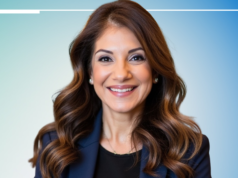Moving in with a Bumble match two weeks after meeting. Not thinking twice that a new boyfriend punched walls whenever he misplaced his keys. Gushing about my love for the Borderlands video game series until a crush’s eyes glazed over. Assuming the non-monogamous couple who kept DMing me to sleep over and chat about sex just wanted to be friends — not flirt their way into a threesome.
Unfortunately, these are not my proudest dating moments.
I always thought I was just painfully awkward with terrible social anxiety. Then, at age 30, I finally unlocked the key that changed everything: an autism spectrum disorder (ASD) diagnosis. This new understanding of myself helped explain all of the cringy, confusing, and downright traumatic experiences throughout my relationship history.
I realized that it was important I bring my full self to my dating life. And that started with being up-front about who I am.
Autism is a neurodevelopmental condition that’s characterized by repetitive or restrictive behaviors as well as difficulties with communication and socializing. According to Ryan Sultan, MD, board-certified psychiatrist, therapist, and professor at Columbia University, some of the most common challenges autistic folks face while dating include interpreting nonverbal cues (like body language), expressing emotions, dealing with unpredictability and change, overlooking red flags, and recognizing signs of dishonesty or ulterior motives.
Experts In This Article
- Dolly Ferraiuolo, LCSW, an autistic psychotherapist and the founder of Share Transformative Therapy and Wellness in Clearwater, Florida
- Ryan Sultan, MD, assistant professor of clinical psychiatry and director of the Mental Health Informatics Lab at Columbia University
These issues pop up for me on the regular as a person dating with autism, until recently, led me to enter unhealthy relationships with mismatched partners. I’m happy to say that re-discovering who I really am underneath that neurotypical mask—and learning how to navigate dating in ways that honor my unique brain and personality—changed everything about my dating life.
Today, with this new self-awareness, I’m doing things differently. And it’s helped me have a more fulfilling romantic life full of connection and closeness.
Opening up about my experience and needs
Once I had my diagnosis (and learned more about myself), I realized that it was important I bring my full self to my dating life. And that started with being up-front about who I am.
“Being open about autism and how it affects [your] dating experience can lead to better understanding and empathy from potential partners,” says Dr. Sultan. It’s true. While it’s scary talking about your mental health or neurodivergence with someone you want to date—and how those things might impact your relationship— it’s key to letting a potential partner into your world.
The first (and only) crush I told about my diagnosis is now my partner. I shared that I was autistic and that journey of self-discovery very casually via text. “We should chat one day,” he replied. “It’s interesting how it’s helping you understand things for yourself better.” Phew, I remember thinking. Acceptance. Non-judgment. Interest! What a relief—he didn’t think I was unworthy of love, which I was afraid would be the case.
Since then, the conversations about autism are open-ended, and his support for me and my needs is ongoing.
“It’s great to chat about things like noise levels, lighting, and how you feel about physical touch,” says Dolly Ferraiuolo, LCSW, an autistic psychotherapist who specializes in helping fellow neurodivergent folks at her practice SHARE Therapy & Wellness in Clearwater, Florida. And that’s exactly what we do.
When I’m overstimulated by loud sounds at a restaurant, I tell him. When we’re home, he asks if it’s okay to play a record or if I want to sit in silence. If I want to watch the same show we always do instead of a new one on our list, there’s no fuss.
Although I may be particular, it’s not all about me. His needs matter, too. So when we have different dinner cravings or energy levels at the end of the night, open communication allows us to find a plan that works for both of us. (It really is as simple as speaking up and talking things out!)
Getting clarity for better understanding
Auditory processing isn’t my strong suit. In the past, I’d pretend I heard what my partner was asking or like I knew what they meant. Nine times out of 10, that would lead to miscommunication and misunderstandings (for obvious reasons).
I don’t leave room for ambiguity anymore. Seeking and receiving clear answers helps give me peace of mind and the ability to move forward with confidence, which ultimately leads to everyone feeling seen and heard.
“Asking direct questions when unsure about a partner’s feelings or intentions can contribute to clarity in communication and avoid misinterpretations,” says Dr. Sultan. For me, it could be as simple as, “What do you mean by that?” or “Was that sarcasm, or are you being serious?” If my partner notices I’m lagging after he says something, he’ll beat me to it and say “That was a joke,” or otherwise confirm his meaning. Granted, that ruins the punchline, but I already did.
Setting clear boundaries and guidelines
I’ve always struggled with change, especially sudden change. Even the smallest shift in plans can ruin my mood and throw off my whole night. “Many autistic individuals thrive on routine and structure, which may not align with the unpredictable nature of dating and relationships,” says Dr. Sultan.
To accommodate, Dr. Sultan says establishing expectations up front can help reduce uncertainty. This might look like talking about preferred communication styles and comfort levels in social settings. What that looks like for me and my partner: We usually eat at home or quiet, intimate restaurants where we can hear each other talk. We sit in the cozy corner of the lounge at a music venue. Swinging by a social event for an hour and not dancing at weddings is ideal for both of us.
“Choosing a familiar and comfortable setting for a date can really help ease any anxiety,” adds Ferrauiolo. “Knowing what to expect can make a big difference.” For me, that predictability is vital.
Leaning on support systems
“With the right strategies and support, autistic individuals can build meaningful and fulfilling relationships,” says Dr. Sultan. It’s true. Dating as an autistic person takes a village. I rely on supportive friends, family members, and a bunch of neurodivergent content creators for help navigating the challenges of dating and romantic relationships. Whether I need a confusing text decoded, to be talked off the ledge when something minor sends me into a meltdown, or advice on how to best move forward in a situation, I have a strong support system of people I can count on.
According to Dr. Sultan, “seeking support from a therapist or counselor who specializes in autism and relationships can provide valuable insights and strategies for navigating the dating world.” My ASD-literate therapist has been one of my biggest cheerleaders and supporters throughout my chaotic dating life, even before we knew I was autistic. She’s helped me boost my confidence, learn about neurodivergence, and gain skills and resources I need to live and love in healthier ways. I’m incredibly fortunate to have her.
Embracing my differences
“Remember, autism is just a different way of thinking, not a flaw,” says Ferrauiolo. “Embrace the unique perspectives and strengths that we bring to relationships.” Yes.
Autism is a spectrum disorder, meaning that it presents differently for everyone. But Ferrauiolo notes some potential perks autistic people may offer in romantic relationships include caring deeply for our partners, having an immense amount of empathy, being incredibly dedicated and loyal, keeping it real and always being honest, and being a clear, direct communicator.
I may still be painfully awkward, but I’m proud of how clear I can communicate. I might have specific needs, but I know myself now better than I ever have before. I also know that I’m not broken or unloveable. I’m just different. And I’m still worthy of love and acceptance, and I’m fully capable of being in a happy, healthy relationship, contrary to what my dating history might suggest.
“It’s crucial to remember that neurodiversity enriches the dating world, and everyone deserves love and companionship, regardless of their neurology,” reminds Dr. Sultan. I’m thankful that I have found a loving partner and am surrounded by people who love me for me. If you’re a fellow autistic person navigating the wild waters of the dating world, don’t lose hope. Know that this is possible for you, too.











